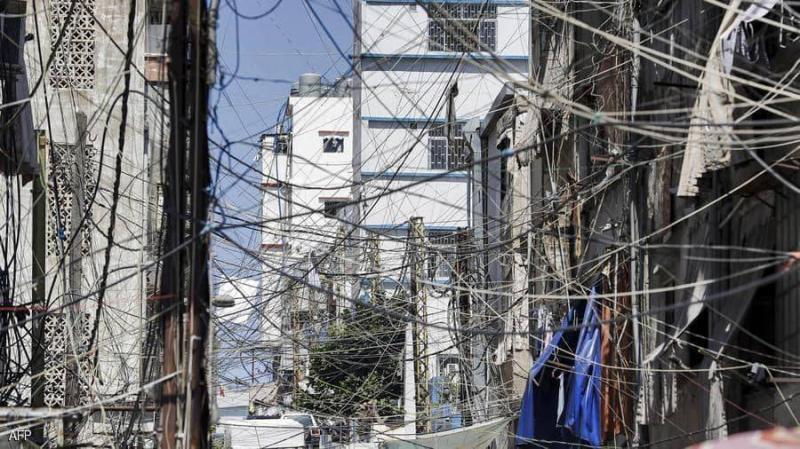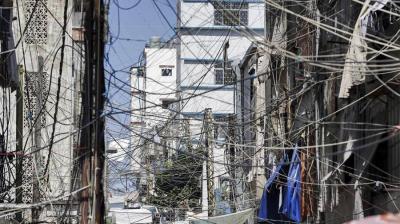The newspaper Al-Liwaa reported that President Najib Mikati's clarifying message to the Parliament opened the door again for a new session of the joint committees called by President Nabih Berri next Tuesday. The agenda includes the continued discussion of the capital control draft law, coinciding with the electricity sector nearing collapse and wheat shortages due to the global crisis arising from the Russian-Ukrainian war, alongside the rising exchange rate of the U.S. dollar moving toward thirty thousand Lebanese pounds for one dollar. There are strong indications that there is no possibility of approving the series of subjects required by the international financial community, despite Deputy Prime Minister Saadeh Shami arriving in the United States for talks with the U.S. Treasury and the World Bank about the urgent need for financing to purchase basic foodstuffs, as well as the electricity program, which has stalled after the World Bank rejected financing to import electricity from Jordan and gas from Egypt.
President Najib Mikati announced that merging capital control with deposit guarantees is a mistake, asserting that capital control should have been approved on the first day the financial crisis began. If the government is to present a plan for economic recovery, it should take this action to keep funds in Lebanon. He confirmed in the Cabinet meeting that the IMF demands the approval of the budget, capital control, bank secrecy, and restructuring of banks, and that matters cannot be placed on recovery without these files being approved with absolute transparency.
Discussions of capital control in the parliamentary committees recently, especially by the Free Patriotic Movement (FPM) deputies, are aimed at achieving two things: first, to refurbish the image of the FPM ahead of the upcoming parliamentary elections and portray it as the defender of depositors' rights before public opinion, contrary to reality; and second, to continue the series of maneuvers by FPM leader Gebran Bassil, aimed at obstructing government policies to resolve the financial and economic crisis, attempting to pressure the government with various issues, most importantly, appointments in key state positions.
Political sources considered attempts to obstruct the discussion of the diplomatic formations bill and the electricity plan—which exceeded the establishment of a power plant in the region of Selaata—and others, to be frozen during the remaining term of President Michel Aoun and left for the next presidency, despite all these rejected pressures. The sources wondered how the FPM could support the capital control draft in the Cabinet, in the presence of the President and many loyal ministers, while simultaneously withdrawing its deputies from committee meetings tasked with studying the draft before it is approved in Parliament, with fiery statements as if they were strangers to the draft. The ministers affiliated with the FPM in the Cabinet did not endorse the draft in Parliament.
The sources pointed out the dual practices and behaviors of the FPM leader with government policies and plans to solve the financial and economic crisis, which do not stop at this point, but also include the continuation of fabricating cases and judicial pursuits against the Governor of the Central Bank, Raed Salameh, who is part of the official team negotiating with the IMF to address the multifaceted crisis facing Lebanon. This is an additional indication of attempts to obstruct the government’s missions and plans for unclear purposes. The sources emphasized that the obstruction of parliamentary committee sessions to impede the study of the capital control draft necessitated rapid communications, especially between Parliament Speaker Nabih Berri and Prime Minister Najib Mikati, leading to Berri's call to set a session for the committees to complete the study of the mentioned draft, with the hope of presenting it in a general session scheduled soon for approval due to its importance in achieving a final agreement with the IMF and confirming the credibility of the promises made by the government for its approval before the fund's officials.
On the other hand, the sources denied the circulated information about the government's reception of a refusal from the World Bank via the Minister of Energy regarding financing the importation of gas from Egypt or electricity from Jordan to Lebanon, stressing that this information is incorrect, while the necessary procedures and measures to complete the project remain underway.
The Cabinet held a session yesterday at the Grand Serail chaired by Mikati, with the attendance of ministers, except for Saadeh Shami due to travel, and Walid Nassar and Mohamed Mortada due to other pressing commitments. Mikati ended the session after about two hours to receive Saudi Ambassador Walid Bukhari, where they discussed bilateral relations between Lebanon and the Kingdom and arrangements for the Prime Minister's visit to the Kingdom, which was rumored to take place yesterday but was postponed for a few days until some arrangements were completed regarding scheduling meetings with Saudi officials, to occur before Eid al-Fitr.
The capital control file, the economic recovery plan, and wheat supply were the highlights of the session. It was reported that Minister of Education Abbas Halabi brought an official memo to the meeting but did not present it; instead, he made a statement opposing the recovery plan and amendments to the bank secrecy law, detailing reasons for the objections, particularly regarding the protection of depositors' rights and ways to safeguard them. He was supported in this position by several ministers from the Amal Movement and Hezbollah.
Mikati expressed understanding for the ministers' positions, indicating his openness to all ideas and discussions. According to ministerial sources, the recovery plan was not presented in detail due to the absence of the Deputy Prime Minister, who is in Washington for discussions with officials from the U.S. Departments of State and Treasury, along with the IMF and the World Bank, about supporting Lebanon after signing the preliminary agreement with the IMF. Therefore, the ministers confined themselves to the general presentation provided by Mikati. The meeting was described by the sources as calm and normal, proceeding without complications.
The Council approved most items, including a 13% reduction in the allocations for foreign missions, with total allocations not exceeding $17,000 at most. The digital transformation strategy project was approved, as well as the contract with Jordan to import electricity.
Mikati stated during the session, "Last time we presented the economic and financial recovery plan in the Cabinet, it was not approved as we awaited comments and opinions. There may be objections and criticisms, but the plan will only become final after being submitted as legislative proposals to Parliament." He spoke to the Speaker of Parliament and expressed hope for a workshop to discuss the amendments to the bank secrecy laws we passed in the Cabinet, which will happen.
He said, "The uproar raised in most part has electoral goals, and we are committed to the rescue process and are open to all remarks regarding the recovery plan. I sent it yesterday to Parliament for their information only, as it has not yet been approved in Cabinet pending further remarks to draft the final version that would achieve a Lebanese consensus. We made a breakthrough on the initial agreement with the IMF, and anyone with other options is invited to advance them."
Mikati addressed the elections file, stating, "I held a meeting with the Ministers of Interior and Foreign Affairs, and all preparations are proceeding correctly. We heard some remarks about the issue of expatriate voting abroad, and the Foreign Minister, who is investigating the matter, indicated that so far, what is happening adheres to the laws and regulations. There may be some flaws and randomness, especially in Sydney, Australia, but the responsibility does not revert to the Lebanese state. Nevertheless, we are studying options and ways to address these issues."
He also urged the Minister of Interior to follow up with the Supervisory Body for Elections to investigate possible electoral violations or bribery and any advertising spending that exceeds the legally allowed limits.
Al-Liwaa learned that the Cabinet approved the request of the Ministry of Social Affairs to grant some associations and institutions the status of public benefit. These institutions are community-based in providing assistance.
Finally, in the health sector, Minister of Health Dr. Firas Al-Abyad discussed significant issues, primarily concerning the drug supply crisis in Lebanon. He noted challenges in accessing crucial medications due to recent funding changes and described initiatives to rectify these issues while also addressing governance around aid from Qatar to supply governmental hospitals with fuel.
The discussions constituted a multifaceted approach to address Lebanon's current challenges, spanning economic, energy, healthcare, and political dimensions, amidst continued negotiations with international financial bodies.




